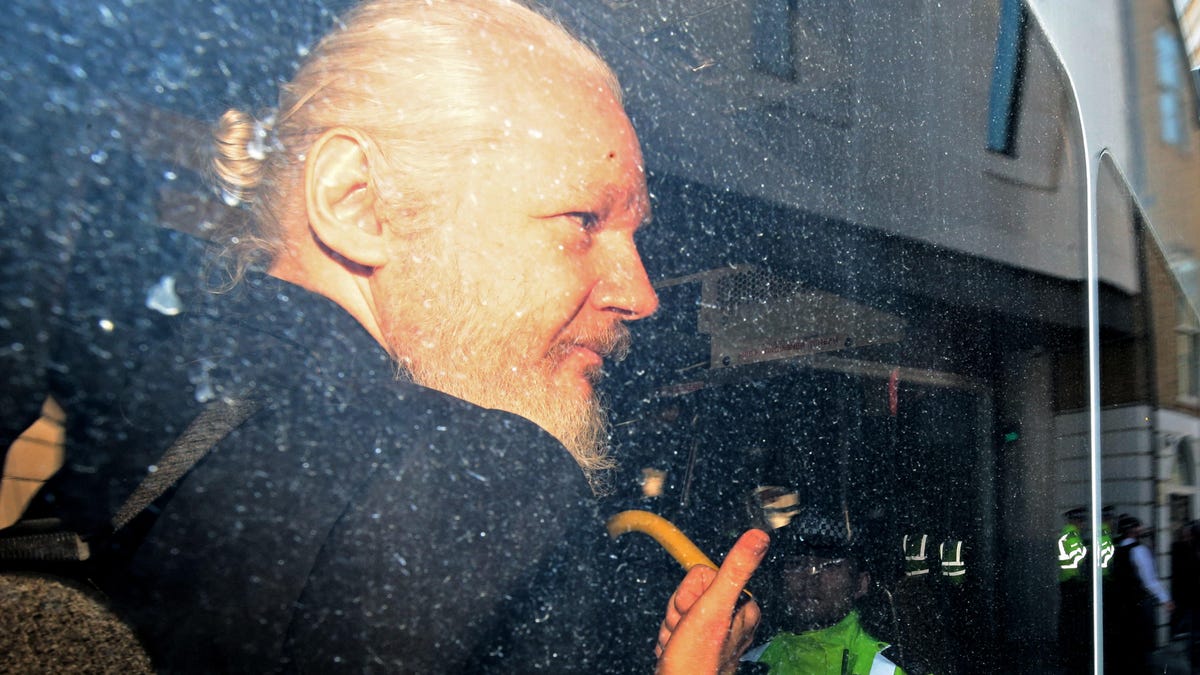Julian Assange and WikiLeaks: Events leading to founder's arrest
Assange was taken into custody in London after living in the Ecuadorian Embassy for almost seven years.

Julian Assange in a police vehicle after his arrest on April 11 in London.
After living in the Ecuadorian Embassy in London for nearly seven years, WikiLeaks founder Julian Assange was arrested Thursday by London's Metropolitan Police. The arrest took place after Ecuador withdrew asylum.
Later in the day, Assange was found guilty of breaching bail, a charge that could lead to as many as 12 months in prison. He could also be extradited to the US, where he faces charges related to his alleged role in "one of the largest compromises of classified information in the history of the United States," according to the US Justice Department. WikiLeaks and Assange have been under scrutiny since the 2010 release of more than 75,000 confidential files related to the war in Afghanistan.
Here are some of the major events leading up to Assange's arrest:
- In June 2012, Assange skipped bail and moved into the Ecuadorian embassy in London to avoid extradition to Sweden over sexual assault allegations. Ecuador offered him asylum amid legal tussles with the US, Sweden and the UK.
- Swedish prosecutors dropped the rape charges against Assange in May 2017, but the WikiLeaks founder was still wanted in the UK for skipping bail in 2012.
- In January 2018, Assange asked a UK court to drop his arrest warrant. Later that month, the government of Ecuador said Assange's situation of being holed up in the embassy was "not sustainable."
- In February 2018, Assange called on the UK and Sweden to grant him freedom, saying the countries were violating a UN order to release and compensate him. The following week, Assange lost a legal bid to halt a UK warrant for his arrest.
- The Ecuadorian embassy cut off Assange's internet access in March 2018 after the government said he violated an agreement not to interfere in its relations with other countries.
- A vigil was held in June 2018 outside the Ecuadorian Embassy in London for Assange's health. An international group of lawyers had appealed to the UN's Human Rights Council, stating concerns that Assange's physical and mental health were being affected by his confinement.
- Media reported in September 2018 that Assange may have sought sanctuary in Russia before ending up at the Ecuadorian Embassy in London in 2012.
- In September 2018, WikiLeaks replaced Assange as its editor-in-chief, installing Kristinn Hrafnsson, a journalist from Iceland. In a statement, WikiLeaks said Assange was being "held incommunicado (except visits by his lawyers) for six months while arbitrarily detained in the Ecuadorian embassy." Assange remained the site's publisher.
- Assange sued the Ecuadorian government in October 2018 for violating his "fundamental rights and freedoms." Ecuador didn't let Assange meet with his lawyers or Dinah PoKempner, general counsel of Human Rights Watch, on many occasions, according to a WikiLeaks statement. The embassy also allegedly censored Assange's speech and required journalists, lawyers and others who wanted to see him to share with Ecuador information such as social media usernames and serial numbers of devices. At the time, Ecuador's foreign minister said the protocols the embassy adopted were in line with Ecuador's laws and international standards.
- In late October 2018, Assange lost a legal challenge to new rules imposed by the Ecuadorian Embassy. They included banning him from commenting on affairs in a way that might harm the country's foreign relations and limiting his visitation privileges. The government said he could be expelled from the embassy if he didn't comply with the rules.
- Reports in November 2018 revealed that Assange had been charged under seal by the US Justice Department with unspecified crimes. Prosecutors had apparently inadvertently revealed the charges while filing an unrelated case.
- In April 2019, UN Special Rapporteur on torture Nils Melzer warned against the expulsion of Assange from the Ecuadorian embassy, saying it could "expose him to a real risk of serious violations of his human rights." Days later, Assange was arrested.

